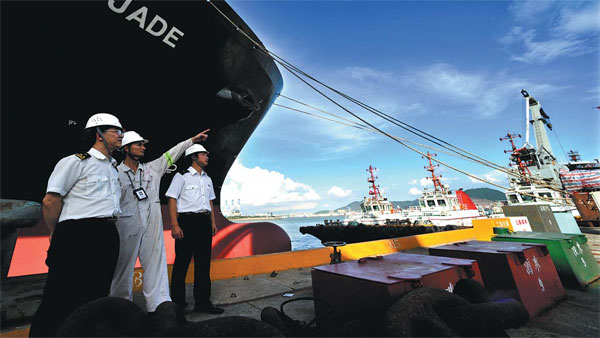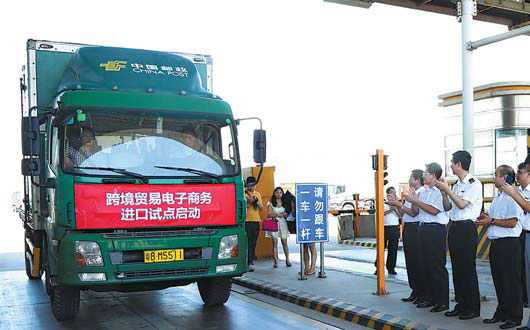Robust growth of e-commerce in zone
Updated: 2015-12-04 08:27
By Chen Hong(China Daily Europe)
|
|||||||||||
Cross-border trade boosted by demand from chinese for quality overseas products
Cross-border e-commerce has experienced robust growth in Qianhai, Shenzhen, spurred by strong demand from the Chinese for quality overseas products.
Shenzhen, which neighbors Hong Kong, became a pilot city of a national scheme to develop cross-border e-commerce that started online exports in November 2013 and online imports in September 2014.
|
Customs workers at the Qianhai Bay Bonded Port Zone, a center of Qinhai's cross-border e-commerce. Photos provided to China Daily |
|
A truck loaded with imported goods leaves the Qianhai Bay Bonded Port Zone. Li An / For China Daily |
Figures from Shenzhen Customs show that imports and exports of the cross-border e-commerce business at Qianhai Bay Bonded Port Zone, which was picked up by the city to implement the pilot, amounted to about $133 million in the first 10 months of this year, four times the total last year.
Qianhai, covering 15 square kilometers of land reclaimed from the sea, received approval from the State Council to become an experimental field for Shenzhen-Hong Kong modern service industry cooperation in August 2010. It was folded into the China (Guangdong) pilot free trade zone in March of this year.
Official figures show that more than 4,000 e-commerce companies had registered in Qianhai by the end of October. By October, about 160 companies had registered with customs to conduct online exports and imports, doubling the number in the first half of this year.
Ding Bao Hong Group was an early adopter that registered in Qianhai and moved its office there. The group, with 1 billion yuan ($156.2 million) registered capital, focuses its business on electronics, finance, real estate and culture industries.
It registered an e-commerce company in July and opened a physical store for its online platform in Qianhai on Nov 27.
"Compared with online shopping, a physical store is a more comfortable shopping style for buyers, especially for senior citizens, but eventually the buyers will be led to choose and pay online," said Hong Hanzhong, the group founder and chief executive officer.
Hong's e-commerce company, 51qhg.com, supplies more than 1,000 products in five major categories: healthcare products, daily necessities, maternal and child products, cosmetics and food and beverages. The products are sourced from more than 20 countries and regions, including New Zealand, Japan, South Korea and Australia.
"We signed agreements with manufacturers for some products or source the products directly with the general agents in China, which ensures the products and keeps the price low," Hong said.
For online-shoppers, a courier company picks up the imported products from a warehouse in the Qianhai Bay bonded zone, which has already ensured the products are genuine, he added.
Products imported in this way enjoy a relatively low tax rate, called personal postal parcel tax, that is at 10-20 percent. Normally, the tax on general trade goods is 30 to 50 percent, according to customs officials.
It is the fifth such store in Qianhai linked to an e-commerce business. Qinhai currently has 90,000 square meters of working space while the remainder is under construction.
As a result of the booming cross-border e-commerce business, the warehouse in the Qianhai Bay bonded zone is constantly full, according to the zone operator.
The bonded zone takes up an area of 3.71 sq km in Qianhai, with about 1.17 sq km developed so far.
"The occupancy rate of the warehouse in Qianhai Bay bonded zone was at 70 to 80 percent before, but now it's always full," said Liu Xiao, director of the bonded zone management sector of Qianhai Authority. He said construction of the second phase of the bonded zone would be accelerated.
Cross-border e-commerce is becoming a main industry in Qianhai, and would eventually generate industrial output of more than 100 billion yuan, he said.
The Qianhai (Hong Kong) Global Shopping Center, which covers an area of about 11,000 sq m, will have a soft opening on Monday.

Hong Kong-based Chow Tai Fook Enterprises won the bid to build and operate the shopping center, which is designed to cover four floors offering 20,000 sq m of retail space and more than 200 parking spaces.
The shopping facility will establish an offline bonded product exhibition and trading store and an online e-commerce website which is expected to become a business-to-business-to-consumer e-commerce platform.
The center is an effort of the local administration to encourage the development of the cross-border e-commerce industry.
Qianhai Authority spokesman Wang Jinxia said the goal is to build up a shopping cluster in cooperation with firms from Hong Kong. "Chow Tai Fook is the first and more will be coming soon."
Advantages
Liu of the bonded zone management sector, said Qianhai has many advantages in developing cross-border e-commerce.
Firstly, as an experimental zone for the modern service industry, Qianhai attaches much importance to fostering the industries of finance, modern logistics, information services and technologies, which could support the development of e-commerce.
Secondly, as the No 1 import and export city of China, Shenzhen has developed a fast and convenient system for handling foreign trade. The customs, quarantine, tax and foreign currency settlement in Qianhai are very efficient.
Thirdly, Qianhai can take advantage of world-leading ports and airports in Shenzhen and Hong Kong, which are located within 30 km of the zone.
chenhong@chinadaily.com.cn
(China Daily European Weekly 12/04/2015 page28)
Today's Top News
Xi in South Africa to boost China-Africa cooperation
SOEs face headwinds as 21% witness profits decline
President Xi arrives at South Africa for state visit
China ready for risks after yuan included in SDR
Premier League coaches to aid China's soccer goal
Chinese companies invest in City Football Group
Investment expected as Xi arrives in Zimbabwe
Xi's Zimbabwe visit to elevate bilateral ties to new high
Hot Topics
Lunar probe , China growth forecasts, Emission rules get tougher, China seen through 'colored lens', International board,
Editor's Picks

|

|

|

|

|

|








